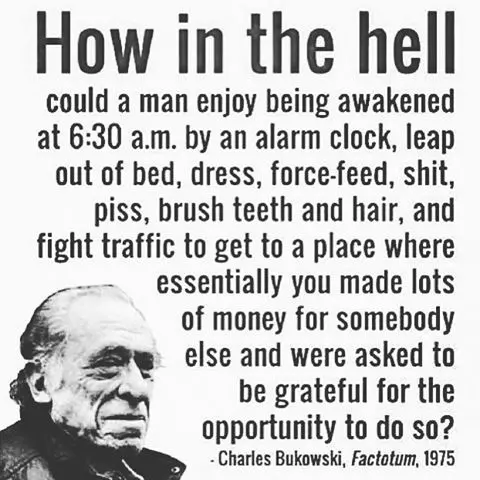this post was submitted on 29 Oct 2023
1570 points (97.4% liked)
Work Reform
10247 readers
407 users here now
A place to discuss positive changes that can make work more equitable, and to vent about current practices. We are NOT against work; we just want the fruits of our labor to be recognized better.
Our Philosophies:
- All workers must be paid a living wage for their labor.
- Income inequality is the main cause of lower living standards.
- Workers must join together and fight back for what is rightfully theirs.
- We must not be divided and conquered. Workers gain the most when they focus on unifying issues.
Our Goals
- Higher wages for underpaid workers.
- Better worker representation, including but not limited to unions.
- Better and fewer working hours.
- Stimulating a massive wave of worker organizing in the United States and beyond.
- Organizing and supporting political causes and campaigns that put workers first.
founded 2 years ago
MODERATORS
you are viewing a single comment's thread
view the rest of the comments
view the rest of the comments

I do not know if they will be net positive, it depends on metric the comparison is made with. I think on pure economic side it is not beneficial for GDP growth. Just take EU and compare it with US. I think the system in US is more fair and closer to true, fair value of labor.
But I think the fair world is a world without compassion and with huge separation between rich and poor. I think on ethical grounds we should make the world less fair, more equalized, despite of the fact that it reduces GDP growth, because there are other metrics possible, like human happiness and well being.
Our conversation started from me noticing that people in this discussion expecting that fair value for labor is higher than what is typically paid. And I think the reverse is true because there are things that artificially increase wages, like minimum wage in many states. So, “be careful what you wish for” kind of thing.
I'm a bit confused by your definition of fair, to the point where I think that we hold the same precepts, but we may using different words for them. I would make the case that increasing 'fairness' is equivalent to making things more equalized. I would use both terms interchangeably.
In any deal, if one party has more leverage than the other, in principle it's not a 'fair' deal, even if the disadvantaged party rationalizes that it could've been worse, or that the other party didn't fully exploit the power of their advantage. In the context of labor, reducing the leverage that employers have over workers is evening out the playing field, which I would say is more fair.
To be clear, in an ideal world, neither party would have leverage over the other, and people would work for someone else or with each other only due to it being mutually beneficial in equal measure. In reality, things will never be that 'perfect', but I think it's absolutely possible to remove the more egregious points of leverage.
The people using existing leverages will try to prevent that by removal kicking and screaming because they don't want their advantages to be reduced, however they should try to be content with an equal power dynamic if they consider themselves at all moral. In all other areas of life humans have decried unjust imbalances of power, and I don't see how labor relations would be subject to different rules than, say, competitive sports. We don't stack the deck against one team or the other, we try to make it fair.
So when you say a fair world would is a world without compassion and even more division between rich and poor, I must ask, how are you defining the word fair?
Fair: without favoritism, cheating, impartial. A fair fight is when two people fighting without any help from anybody. Giving one guy extra boost (say, special gloves) because he is weaker is unfair, but more equal.
I think equality in freedom is fair. Equality in means is comparison and not fair, since you have to be partial and take money from the rich and give to the poor. It would be fair only if the rich actually stole from the poor against the law of the land, but if the rich earned himself (say, he is a successful lawyer) then equalization of means is not fair.